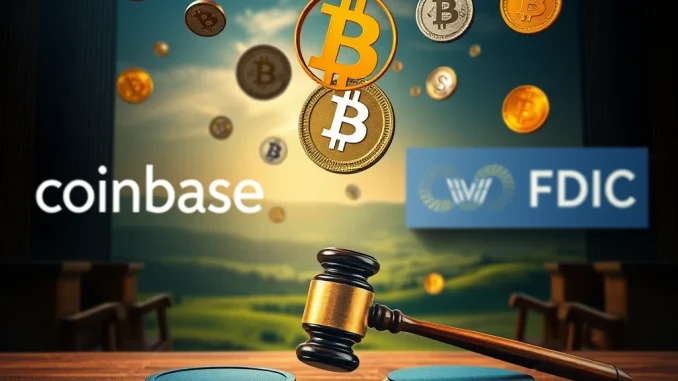
Exciting news for crypto enthusiasts and legal eagles alike! The rollercoaster lawsuit between cryptocurrency giant Coinbase and the Federal Deposit Insurance Corporation (FDIC) is back on track. After a temporary pause, a U.S. court has given the green light, lifting the stay on Coinbase’s Freedom of Information Act (FOIA) lawsuit against the FDIC. What does this mean for the future of crypto regulation and transparency? Let’s dive into the details of this pivotal case.
Why is the Coinbase FOIA Lawsuit Against the FDIC So Important?
At its heart, this legal battle is about transparency and access to information. Coinbase, a leading player in the cryptocurrency exchange space, initiated a Freedom of Information Act (FOIA) request, seeking crucial documents from the FDIC. But what exactly is Coinbase looking for, and why is the FDIC seemingly hesitant to share?
According to Coinbase, the FDIC is allegedly withholding key documents that are vital for understanding how the agency views and regulates cryptocurrency businesses. Paul Grewal, Coinbase’s Chief Legal Officer, took to X (formerly Twitter) to announce the court’s decision, signaling a significant step forward in their pursuit of information. This lawsuit underscores the ongoing tension and the need for clarity in the regulatory landscape surrounding digital assets.
What Exactly is a FOIA Lawsuit, and Why is Coinbase Using It?
The Freedom of Information Act (FOIA) is a powerful tool that grants the public the right to request access to federal agency records. Think of it as a way to peek behind the curtain of government operations and ensure accountability. Coinbase is leveraging this act to compel the FDIC to release information they believe is being unjustly withheld.
Here’s a simplified breakdown of why Coinbase might be pursuing a FOIA lawsuit:
- Seeking Transparency: Coinbase wants to understand the FDIC’s internal communications, policies, and assessments related to cryptocurrency companies. This transparency is crucial for crypto businesses to operate within a clear regulatory framework.
- Addressing Concerns: There might be concerns within Coinbase about how the FDIC perceives or is treating crypto firms. Access to documents could shed light on any potential biases or misunderstandings.
- Leveling the Playing Field: Information is power. By obtaining these documents, Coinbase aims to ensure fair treatment and a level playing field within the financial sector, where traditional institutions and crypto companies are increasingly interacting.
Crypto Regulation in the Crosshairs: What Does This Lawsuit Mean for the Industry?
This isn’t just a spat between two entities; the Coinbase FOIA lawsuit against the FDIC carries significant implications for the broader crypto industry and the future of crypto regulation. The outcome could set precedents for how regulatory bodies interact with and oversee cryptocurrency businesses.
Consider these potential impacts:
| Impact Area | Potential Outcome |
|---|---|
| Transparency in Crypto Regulation | If Coinbase succeeds, it could force regulatory bodies to be more transparent about their decision-making processes concerning crypto. This could lead to clearer guidelines and reduce uncertainty for businesses. |
| FDIC’s Stance on Crypto | The documents sought could reveal the FDIC’s internal views and strategies regarding crypto assets and businesses. This insight is invaluable for the industry to anticipate and adapt to regulatory expectations. |
| Future FOIA Requests | A successful lawsuit might encourage other crypto companies to use FOIA requests to gain clarity from regulatory agencies, fostering a more open dialogue and potentially preempting conflicts. |
| Investor Confidence | Increased transparency can boost investor confidence in the crypto market by demonstrating a move towards clearer and more predictable regulatory oversight. |
Coinbase’s Fight for Transparency: A Win for the Crypto Space?
The resumption of this lawsuit is undoubtedly a win for Coinbase, as it allows them to continue their pursuit of information. But is it a win for the entire crypto space? Many would argue yes. The demand for transparency from regulatory bodies is a common theme within the crypto community, which often feels like it’s operating in a gray area of regulation.
Here’s why this fight for transparency resonates with the crypto industry:
- Reduced Uncertainty: Clearer regulations mean less uncertainty. Businesses can plan and innovate more effectively when they understand the rules of the game.
- Fairer Regulation: Transparency can help ensure that regulations are fair, unbiased, and based on factual understanding rather than misconceptions about cryptocurrency.
- Industry Growth: A transparent and well-defined regulatory environment can foster growth and attract more institutional investment into the crypto sector.
What’s Next in the Coinbase vs. FDIC Legal Battle?
With the stay lifted, the lawsuit will proceed. The court will likely examine Coinbase’s claims and the FDIC’s reasons for withholding information. It could involve document discovery, legal arguments, and ultimately, a court decision on whether the FDIC must release the requested documents.
Keep an eye on Paul Grewal’s X feed and Coinbase’s official announcements for updates as this case unfolds. The outcome of this legal tussle could have far-reaching consequences for the relationship between crypto companies and regulatory bodies in the U.S. and beyond.
Conclusion: A Crucial Step Towards Clarity in Crypto Regulation
The court’s decision to lift the stay in Coinbase’s FOIA lawsuit against the FDIC is more than just a procedural step; it’s a crucial development in the ongoing quest for clarity and transparency in crypto regulation. Coinbase’s determined pursuit of information could pave the way for a more open and understandable regulatory environment, benefiting not only Coinbase but the entire cryptocurrency ecosystem. As this case progresses, it serves as a powerful reminder of the importance of dialogue, transparency, and the rule of law in shaping the future of digital finance. Stay tuned for further updates on this landmark case!



